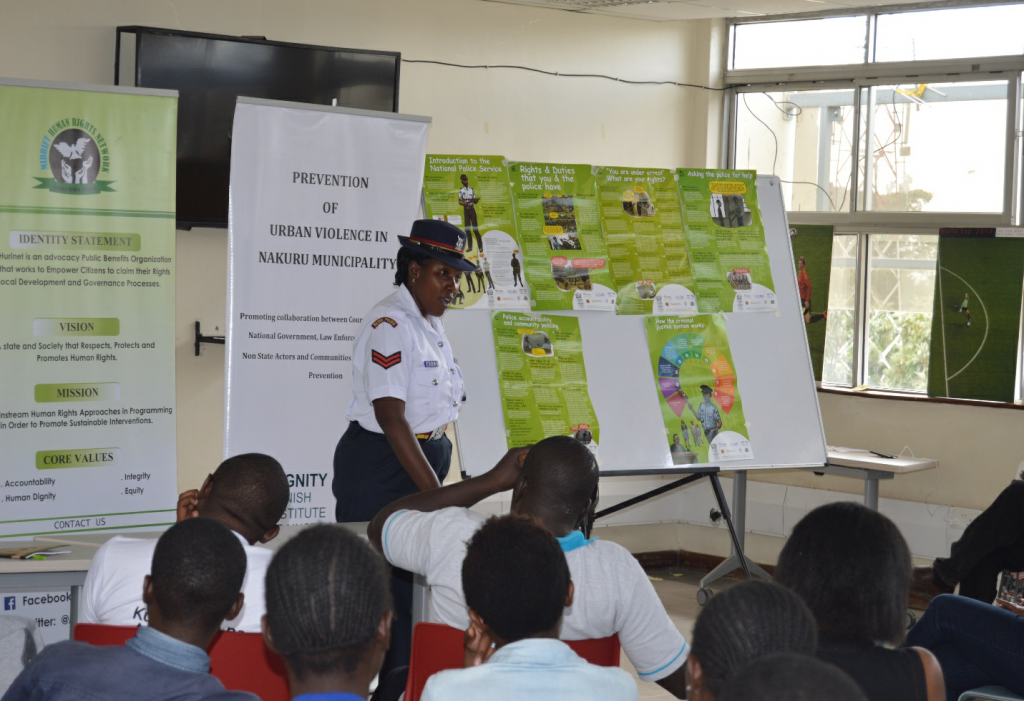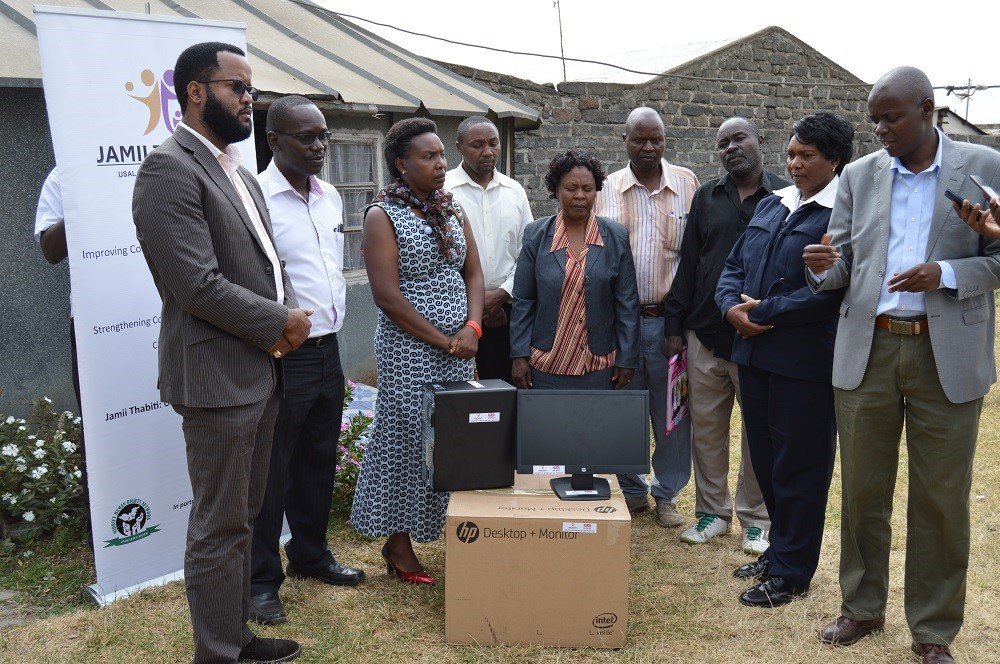Midrift Human Rights Network Supporting Security Governance in Nakuru County

The concept of good governance is premised upon three cornerstones namely: legitimacy, accountability and transparency. Governance in the security sector in Kenya faced by a police “service” and society in which corruption, human rights violations and lack of transparency are normalized leading to a diminished capacity for security sector governance.
Even though security has long been viewed as a preserve of the government, the constitution of Kenya 2010 brought in fundamental reforms including Security Sector Reforms. This then ushered in a variety of constitutional, legal, and policy changes that require infusing of the principles of accountability, professionalism, and efficiency into a security sector which has had a history of operating beyond the rule of law. It then gives sovereign powers in the preamble to the citizens as the government to which they delegated powers. Drawing from Theodore Roosevelt quote; “Patriotism means to stand by the country. It does not mean to stand by the president or any other public official, save exactly to the degree in which he himself stands by the country. It is patriotic to support him insofar as he efficiently serves the country. It is unpatriotic not to oppose him to the exact extent that by inefficiency or otherwise he fails in his duty to stand by the country. In either event, it is unpatriotic not to tell the truth, whether about the president or anyone else.”
Over the past few decades, the love-hate relationship between the citizens and police has intensified; leading to confrontations in public order management. Unfortunately, citizens largely regard the state security instruments as oppressive, while the security agents, on the other hand, regards citizens with utmost suspicion and sometimes as a threat to state security. The civil society perceives the public security sector regime as secretive and as a representation of an often unresponsive government while in turn the civil society is regarded as representing interests outside those of the citizens. As Tarrin-Rae Oxche, Junior Researcher in Security Sector Governance avers, one could argue therefore that the relationship between government and civil society has been largely one riddled with mutual distrust, misunderstanding and suspicion. The question may be posed then should security governance issues be left as a preserve of the state, given the seemingly massive ‘onslaught’ on civil society on the continent in general? Or alternatively, shouldn’t civil society be accorded an opportunity to contribute to the attainment of security?
In the midst of these perceptions, drawbacks and mistrust, Midrift Hurinet drawing from police reforms and largely operationalization of the National Police Act 2011, has been in the forefront in fostering relationships between police officers and citizens through community policing.
Bridging the gap
To bridge the gap between the citizen and police, for enhanced collaborations on prevention violence, Midrift Hurinet has been bringing together Police Officers, National Government Administration Officers, the communities and relevant authorities around Nakuru and Naivasha Municipalities. Formation of Community Policing Committees (CPCs) in five police stations across Nakuru and Naivasha municipalities to prevent violence. CPCs whose capacity has been built on their mandate using Inspector General’s guidelines on Community Policing has helped build trust between citizen and police leading to increased cooperation in violence prevention. Through library outreach programs in partnership with the Kenya National Library Services (KNLS) in Nakuru and Naivasha, Midrift Hurinet has been facilitating dialogue between students and the police to build trust amongst them. Using the ‘101 Questions and Answers you wanted to ask the police but were too afraid to ask’ tool (also developed into posters and an App -Kenya Police 101), we have been able to create awareness on the students, citizens and the police of their rights and responsibilities.
Through Mulika Uhalifu SMS Code, citizens are able to report violence incidences directly to over 30 senior police officers in their counties as well as the County commissioner and are guaranteed a prompt response. 22068’, this means the officers easily and often get crime and violence reports which they act upon immediately through the instruction or orders of their commanders who have accessibility to the texts. Most rogue officers are reported either via CPFs, CPCs or the mobile-based platform. The cases have successfully been followed up by the Hurinet ensuring accountability. Due to rise in reported cases, issues such as illicit alcohol brewing, gender-based violence and other crimes are slowly reducing.
A Gender desk under a tree
Like many other police stations in Nakuru, Kaptembwo police station is modelling in community policing by the support of MidRiftHurinet. Through strengthening Kaptembwo CPC, they have been able to engage the National Government Constituency Development Fund (NG-CDF) to put up a perimeter wall around the police station. The wall helped shield the Gender and Children Affairs officer who sits on a bench under a tree attending to victims of GBV.

Gender officer from Kaptembwo police station leading discussions on 101 Q&A booklet on police at KNLS Nakuru Library
Negative perception of human rights organizations
In Naivasha, where the cordial relationship between officers and citizens was a mirage, community members have begun to work closely with officers in highlighting social ills as well identifying rogue police officers forwarding complaints to the relevant departments including IPOA and IAU. Midrift Hurinet has helped to identify and iron out specific issues that have been affecting Naivasha. Initially, officer confessed that they had a negative perception of human rights organizations. They viewed them as unjust to the police and always looking out for isolated incidences when a single police officer commits a violation of human rights, then stereotype the whole police service. They are now embracing the partnership in hastening reforms focused on the improvement of service delivery as well as helping curb insecurity. CPC members at the Naivasha Central Police Station often interact with all these stakeholders in their day-to-day work. CPC members have since found it easy to work with police officers after bonding and trust building initiated and facilitated by Midrift Hurinet. They are currently planning to lobby for allocation of funds from Ministry of Interior and NGCDF for the upgrading of police houses, office blocks and building of toilets at the station. A CPC member confirms that whenever she refers or reports cases to the police, she always takes the occurrence book (OB) number so that she can follow up on the case, a practice she never used to with reservations of sole responsibility of the police.
Re-Energising Community Policing In Elementaita
As they expressed their security concerns. This was during a meeting organized by Midrift Hurinet in 2016. The County Police Commander had come to launch area Community Policing Forum (CPF).
Though the area had community policing committee (CPC) members, they were not active in organizing CPFs. However, the presence of the County Police Commander at a meeting that was addressing violence prevention made everyone rethink the importance of security.

Midrift Hurinet donating Computers at Elementaita Police Station
Digitalizing police records at Elementatita and Kaptembwo police stations
In a rarity of practice, and to circumvent excuse of lack of capacity, Midrift Hurinet through its partners provided computers to digitalize records and aid in the processing of complaints at the station in Elementaita and Kaptembwo police stations. The OCSs in the two police stations are hopeful that the computers will ease their work as the station’s OCSs acknowledging the strong and active community policing committee (CPC). The issues are being addressed through a partnership between their office, CPC and Midrift Hurinet. A case of the station’s land which has been grabbed and sold out is also being followed up in Elementaita police station.

Donating Computers at Kaptembwa Police Station
Challenging the norm
Through encouraging working relationships and reducing violence and criminality, outstanding officers have been promoted. A senior officer at the county attributes promotion of some officers in the area to active CPC members who often write to the Kenya Police Service commending outstanding performers. This has created a challenge to adamant officers with the mentality of a police force to reinvigorate and work towards achieving promotions from exemplary working with communities. In certain instances, those resisting change has met community wrath with complaints against them being reported anonymously through the SMS code 22068 and or directly to the County Commander.
Achieving lasting and effective reform requires addressing issues of management, leadership, political will, set attitudes, established behaviors and negative public perceptions. Its very complexity can be intimidating. Nonetheless, its centrality means that it is an issue that cannot be shied away from.
Moses Chavene – The writer works at Midrift Hurinet as a project officer.

